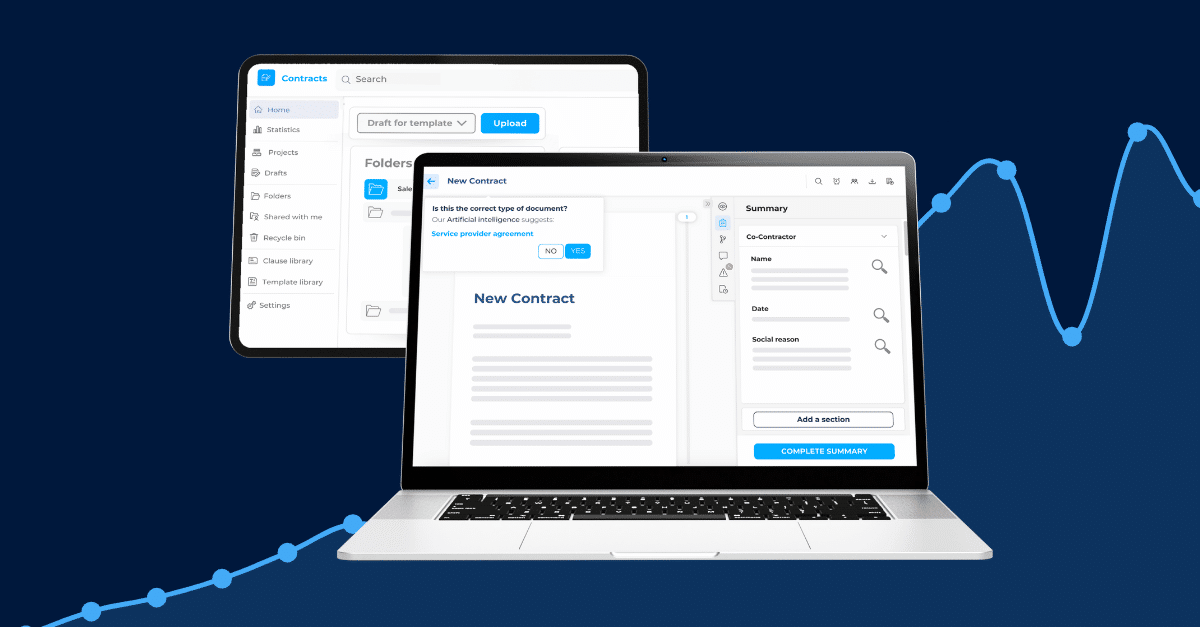Modern organizations manage hundreds or even thousands of contracts simultaneously. Without proper visibility into these agreements, companies risk missing renewal dates, overlooking compliance issues, and losing valuable insights that drive business decisions. A contract management dashboard serves as the central nervous system for contract operations, providing real-time visibility, actionable analytics, and streamlined oversight of your entire contract portfolio.
The Strategic Value of Contract Management Dashboards
Contract management dashboards deliver significant strategic advantages by centralizing contract information and presenting it in an accessible, visual format. Unlike traditional contract management approaches that rely on spreadsheets or disconnected systems, dashboards provide a unified view of contract data.
Real-Time Visibility for Informed Decision-Making
A comprehensive contract management dashboard offers immediate insights into contract status, upcoming deadlines, and performance metrics. This visibility enables teams to make data-driven decisions rather than relying on incomplete information or gut feelings.
For example, finance departments are able to track contract value across the organization, while procurement teams monitor vendor performance against contractual obligations. This cross-functional visibility ensures all stakeholders access the information they need without lengthy searches through document repositories.
Risk Mitigation Through Proactive Monitoring
Contract risk management becomes significantly more effective with dashboard technology. The system automatically flags critical dates, compliance issues, and potential problems before they escalate into costly situations.
Additionally, dashboards enable organizations to:
- Track approval workflows and identify bottlenecks in the contract process
- Monitor contract performance against established metrics
- Identify patterns across contract types to inform future negotiations
Enhanced Reporting Capabilities
Generating comprehensive reports on contract performance traditionally required manual data collection and analysis. Modern contract management dashboards automate this process, allowing teams to generate detailed reports with a few clicks.
These reporting capabilities prove particularly valuable for regulatory compliance, financial planning, and strategic business reviews where contract data plays a critical role.
Essential Components of an Effective Contract Dashboard
The most valuable contract management dashboards include several core components that provide comprehensive contract oversight while remaining intuitive for users.
Key Performance Indicators and Metrics
Effective dashboards prominently display key performance indicators (KPIs) that align with organizational priorities. These metrics typically include:
- Total contract value by department, region, or contract type
- Number of contracts in each stage of the lifecycle
- Average time to approval
- Renewal rates and upcoming renewal dates
- Compliance status across the contract portfolio
These metrics enable teams to track performance over time and identify areas for improvement in the contract management process.
Customizable Views for Different Stakeholders
Different teams interact with contracts in unique ways. Legal departments focus on risk and compliance, while sales teams prioritize renewal opportunities and customer relationships. Effective dashboards offer customizable views tailored to each stakeholder’s role.
For instance, executives might see high-level financial metrics and risk indicators, while contract administrators access detailed workflow information and document status updates. This customization ensures each user receives relevant information without overwhelming them with unnecessary details.
Document Status Tracking and Alerts
Contract dashboards must provide clear visibility into where each contract stands in its lifecycle. Color-coded status indicators, progress bars, and automated alerts help teams track contracts from initiation through execution and renewal.
The system should automatically notify relevant stakeholders about upcoming deadlines, required approvals, or potential issues requiring attention. These proactive alerts prevent contracts from falling through the cracks during busy periods.
How Dashboards Transform Contract Management Processes
Implementing a contract management dashboard fundamentally changes how organizations handle their agreements, creating efficiencies throughout the contract lifecycle.
Streamlining the Contract Lifecycle
Contract dashboards connect previously disconnected stages of the contract lifecycle. From initial drafting through negotiation, execution, and renewal, the dashboard provides a consistent interface for tracking progress and managing transitions between phases.
This streamlined approach reduces delays between stages and ensures contracts move efficiently through the approval process. Teams spend less time on administrative tasks and more time on strategic contract management activities.
Improving Cross-Functional Collaboration
Contracts typically involve multiple departments – legal, procurement, finance, and business units all play important roles. Dashboards facilitate collaboration by creating a shared workspace where all stakeholders access the same information.
This collaborative environment reduces miscommunication and ensures everyone works from the most current contract version. When questions arise, team members are quickly able to reference the dashboard rather than sending emails or scheduling meetings to gather information.
Enabling Data-Driven Contract Strategy
Perhaps the most significant transformation comes from the analytics capabilities of contract dashboards. Organizations gain insights that inform future contract strategies, such as:
- Identifying the most favorable terms across similar contracts
- Recognizing patterns in successful negotiations
- Understanding which contract types deliver the greatest value
- Pinpointing common causes of contract disputes or issues
These insights allow organizations to continuously improve their contract management approach based on actual performance data rather than assumptions.
Best Practices for Implementing a Contract Dashboard
Successfully implementing a contract management dashboard requires thoughtful planning and execution. Following these best practices increases the likelihood of adoption and maximizes the system’s value.
Align Dashboard Design with Organizational Goals
Before selecting or configuring a dashboard, clearly define what your organization needs to track and measure. The most effective dashboards align with specific business objectives rather than trying to display every possible metric.
Focus on the information that drives decisions and supports your organization’s strategic priorities. This focused approach prevents information overload and ensures the dashboard delivers actionable insights.
Ensure Data Accuracy and Integration
A dashboard is only as valuable as the data it contains. Establish processes for maintaining data quality and integrate the dashboard with existing business systems to ensure information flows seamlessly between platforms.
Many organizations benefit from integrations between their contract management dashboard and other tools such as:
- Customer relationship management (CRM) systems
- Enterprise resource planning (ERP) platforms
- Electronic signature solutions
- Financial management software
These integrations create a more comprehensive view of contract relationships and eliminate duplicate data entry.
Balance Comprehensive Information with Usability
While dashboards should provide detailed contract information, they must remain intuitive and user-friendly. Overwhelming users with excessive data points reduces adoption and limits the dashboard’s effectiveness.
Choosing the Right Contract Management Dashboard Solution
Selecting the appropriate dashboard technology requires careful consideration of your organization’s specific needs and resources.
Key Features to Evaluate
When assessing potential solutions, prioritize these critical capabilities:
- Customizable dashboard views for different user roles
- Robust analytics and reporting functions
- Automated alerts for critical dates and events
- Integration capabilities with existing systems
- Security features to protect sensitive contract information
- Scalability to accommodate growing contract volumes
Additionally, consider whether the solution offers artificial intelligence capabilities for contract analysis and data extraction, as these features increasingly drive efficiency in contract management.
Security and Compliance Considerations
Contract dashboards contain sensitive business information, making security a top priority. Evaluate potential solutions based on their security certifications, access controls, and compliance with relevant regulations in your industry.
The Future of Contract Management Dashboards
As technology evolves, contract management dashboards continue to advance. Artificial intelligence and machine learning now enhance these platforms, automatically extracting key contract terms, identifying risks, and even suggesting improvements to contract language.
These AI-powered capabilities transform dashboards from passive reporting tools into active participants in the contract management process. Organizations that embrace these technologies gain competitive advantages through faster contract cycles, reduced risk, and more strategic contract management.
Unlocking Strategic Value Through Smarter Contract Oversight
A well-designed contract management dashboard delivers transformative benefits across the organization – from legal and procurement teams to finance departments and executive leadership. By centralizing contract information, automating routine tasks, and providing actionable insights, these dashboards enable more strategic approaches to contract management.
Organizations seeking to optimize their contract processes should evaluate how a comprehensive dashboard solution might address their specific challenges and opportunities. With the right implementation, a contract management dashboard becomes an invaluable tool for driving efficiency, reducing risk, and maximizing the value of your contract portfolio.The DiliTrust Governance Suite offers a state-of-the-art Contract Management module with powerful dashboard capabilities designed specifically for legal departments and business teams. Our solution provides the visibility, analytics, and security organizations need to transform their contract management processes. Want to learn more about it? Contact us today!




